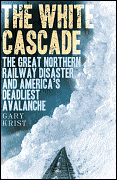
The White Cascade
|
Snow on the tracks
REVIEW BY HOWARD SHIRLEY In February of 1910, two trains set out to cross the Cascade Mountains of Washington state, steaming from Spokane to Seattle through the remote Stevens Pass. That the Great Northern Railway could build and maintain such a route was heralded as an example of man's triumph over nature—but nature had not yet begun to fight. Within hours, both trains would become trapped in the middle of the stark and desolate pass, caught by a snowstorm greater than any recorded to that day. By the time the ordeal was over, both trains lay crushed by a massive avalanche, and nearly 100 passengers, crew and railroad workers lay dead under the snow. The White Cascade: The Great Northern Railway Disaster and America's Deadliest Avalanche tells their story and the story of those few who survived, as well as that of the railroad men who struggled to free the trains only to have their efforts thwarted—and their wisest choice turned into the worst mistake of all. The book surges along with the inexorable pull of a suspense novel. Gary Krist uses letters and journals of the victims as well as court documents and (often unreliable) newspaper accounts to great effect, reproducing both the conversations and thoughts of the victims and their would-be rescuers. The result produces a dramatic arc that builds in tension as the inevitable disaster approaches, allowing the reader to connect with the participants and become concerned about their fates. The characters themselves are fascinating, a mixture of the heroic and the callous, caught in a battle of man and his machines against the might of nature. The story of the disaster is also linked to the story of the American railroad system and the famous (and sometimes infamous) industry barons who built it, a connection Krist explores with an objective eye, never losing sight of the human drama of the event itself. The White Cascade offers something for readers of many genres, from history and railroad buffs to fans of disaster stories and tales of human nature. The writing is fluid, skillful and taut, consistently compelling throughout. The trip through The White Cascade is a journey worth taking. Howard Shirley writes from Franklin, Tennessee.
|
© 2007 ProMotion, inc.
